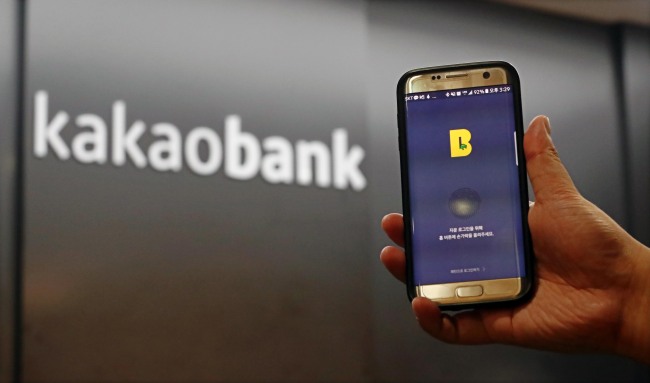Kakao Bank, South Korea’s biggest direct bank, announced Monday it would start selling housing deposit loan products for either a two-year period jeonse (lease with down payment) contract or monthly rent, from Tuesday.
A face-to-face process when submitting documents will not be required, like other products of the online-only bank, partly with the help of scraping technologies that enable the bank to extract documents regarding housing deposit loan borrowers’ identification.
The announcement marks a step forward for the bank that has moved to expand its lending business portfolio. Since the launch in July 2017, Kakao Bank has only sold consumer loan products.
 |
(Yonhap) |
A Kakao Bank user may take out six-month convertible floating rate loans for up to 222 million won ($210,000), with a yearly interest rate of 2.82 percent or more. The rate is subject to changes based on the cost of funds index (Cofix) on monthly acquired new funds, which stood at 1.79 percent in December. Borrowers can repay the loans over at most three years.
In compliance with prerequisites suggested by the state-run Korea Housing Finance Corporation, those buying houses which cost more than 400 million won in areas near Seoul or 200 million won in other areas cannot apply. Also, those employed for less than one year or those who already took out loans for housing deposits will be rejected from loans while screening.
Throughout the screening process, users give Kakao permission to access their digital signature certificates by the government. The bank’s scraping technology then scans the documents stored in the certificates, which contain proof of identity, family and marriage status, as well as other data. The information will then automatically be sent to a center staffed by 22 employees through scraping technologies.
The government‘s decision Monday to repeal the mandatory use of digital authentication certificate would not pose a hurdle, as those documents can also be stored in certificates developed by the bank and is valid for user verification, said Kim Woo-tae, an official at the Korea Housing Finance Corporation.
Kakao Bank has yet to come up with an alternative plan in response, said a media representative of the bank.
Separately, borrowers should send images of the housing contract and the receipt to the center.
A user can even apply for the loans on weekends, according to the bank. The screening process is trackable via the Kakao Bank mobile app.
A borrower would be able to enjoy a more convenient and faster way through its branchless service, Paolo Lee, a Kakao Bank official in charge of financial product sales, said in a press briefing Monday.
“Users had to go through a cumbersome process when borrowing housing deposit loans from conventional banks,” he said. “Borrowers had to visit an offline bank branch three or four times, cannot figure out how much the screening proceeded, while the process pauses on weekends.”
He added a second loan product is designed to appeal to those in their 20s and 30s, which account for 63.8 percent of all of its 5 million account holders.
The new product is modeled to be extended to at most 150 borrowers a day, following its internal simulation, according to the bank.
Kakao Bank has drawn deposits and savings worth 5.2 trillion won as of Jan. 7, while extending loans worth 4.8 trillion won. The bank also issued stocks to raise 500 billion won of capital in September.
By Son Ji-hyoung (
consnow@heraldcorp.com)







![[Today’s K-pop] Blackpink’s Jennie, Lisa invited to Coachella as solo acts](http://res.heraldm.com/phpwas/restmb_idxmake.php?idx=644&simg=/content/image/2024/11/21/20241121050099_0.jpg)
